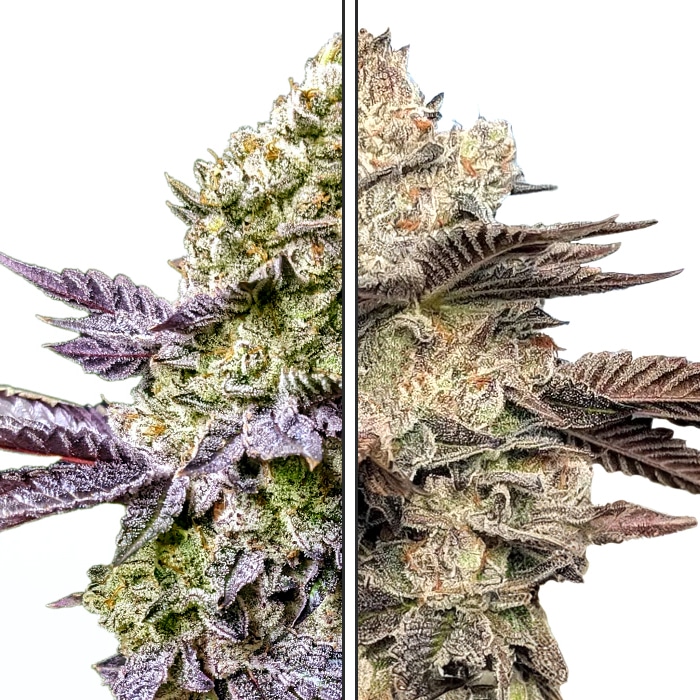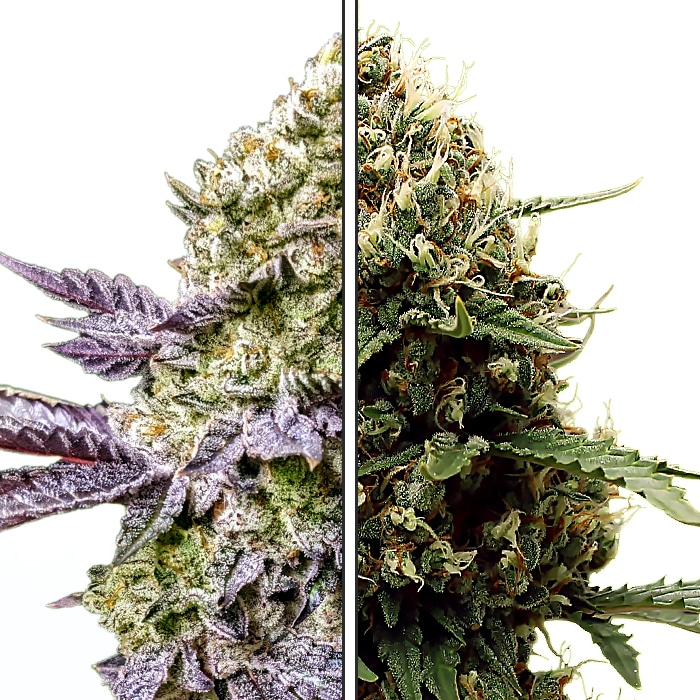Purple Cookie Kush, Seeds, Seeds
- GSC x Purple Kush
- Grape Coffee Caram
- Dense Purple Triche
- Alluring Scent
You may also like...
Description
Purple Cookie Kush Feminized seeds feature a remarkable combination of Girl Scout Cookies and Purple Kush genetics, resulting in a well-balanced 60% indica / 40% sativa hybrid. The unique flavor profile offers a delightful blend of grapes, coffee, caramel, earthiness, and spicy sandalwood, making it a fascinating addition to any seed enthusiast’s collection.
Showcasing a compact and sturdy structure, Purple Cookie Kush displays dense, trichome-covered buds, highlighted by dark forest-green and captivating purple hues.
Purple Cookie Kush’s terpene profile boasts a truly unique and captivating aroma. The unmistakable grape scent, a rare trait in cannabis, is complemented by spicy hashish, earth, and sandalwood notes, reminiscent of the GSC strain. This complex and alluring scent profile adds to the strain’s appeal and makes it a must-have for any seed collection.
Strain Profile
| Flavor Profile | Grape, Coffee & Caramel |
|---|---|
| Lineage | Girl Scout Cookies x Purple Kush |
| Strain Name | Purple Cookie Kush Feminized |
| Strain Type | Sativa 40%/Indica 60% |
Purple Cookie Kush, Seeds, Seeds
| Potency |
N/A
|
|---|---|
| Contents | CBD |

Buy Legal THC
Yes, it’s the THC you’re thinking of – and yes, it’s now legal to buy.

100% Satisfaction Guarantee
Your happiness, guaranteed. We mean it.

Discreet Delivery
Quiet deliveries, because what you order is your concern, not anyone else’s.
A cannabis plant can be either male or female. The female plants produce flowers with high cannabinoid and terpene concentrations, while the male plants produce seeds and pollen with little to no active compounds. For this reason, female plants are highly sought after, and male plants can pose an extreme risk. If a male plant is present, this could result in the pollination of the female flower, which would then shift towards seed production rather than continuing flower maturation. Cannabinoid and terpene levels will no longer be the main feature of the plant. To avoid this, most cannabis plants are grown from feminized seed that has been selectively bred, treated, or engineered to produce exclusively (99.9%) female plants.
Strain Type
Sativa type cannabis strains originate from warmer climates in Asia and South and Central America. These plants are acclimated to high temperatures, they often have higher tolerance or resistance to mold pathogens, and humidity. Sativa plants typically grow quite tall and have a narrow growth habit. The leaves and flowers match this shape with long, airy, thin leaves and buds. This plant architecture allows for airflow movement through the plant and is part of what helps the plants resist mold development on tighter internal structures.
Indica cannabis strains originate from cooler, high altitude mountainous regions of Asia and the Middle East. These plants adapted to grow and reproduce quickly in climates with a short warm season. For this reason, indica plants grow on the smaller side and remain compact as they develop. Indica plants produce large leaves that are wide and stout in shape. Flowers grow in thick and dense on these plants, which creates a beautiful bud but also an optimal environment for pests and molds.
Hybrids that are a pairing of sativa and indica plants, a good hybridized strain can produce even stronger and more resilient plants than a completely indica or sativa strain. As a combination of the different types of cannabis, these hybrid plants can represent the best qualities of both indica and sativa. With their increased vigor and acclimation to a wider range of climates, hybrids are the most common cannabis varieties available today. They are often considered indica-dominant or sativa-dominant depending on the genetic lineage.
Flowering Style
Photoperiodic strains are the most common type of cannabis plant. These plants begin to flower based on day length in outdoor grows and light schedules in indoor grows. Longer periods of light availability are required for the plant to continue vegetative development, more than 14 hours of uninterrupted light per day. Once daylight hours shorten below 14 hours or the light cycle is reduced to the recommended 12 hours, plants will begin flower development. Photoperiodic plants offer some flexibility as flowering can be initiated at a chosen time after at least 4 to 6 weeks of vegetative growth, but they can remain in this stage much longer if needed. The plants may then begin to flower at the selected time, and require 7 to 10 weeks to develop fully mature buds. All of our photoperiodic strains are available as feminized seed.
Autoflower plants are pre-programmed to flower a certain amount of time after germination, this typically occurs after 2 to 4 weeks of vegetative growth. The plant automatically begins to develop flowers without any change in day length for outdoor grows or light cycle for indoor grows. This is a contrast to most cannabis plants which are photoperiodic and depend on day length or light cycle to determine when flowering begins. Because of this pre-defined programming, autoflower plants grow a little bit differently. Autoflowers tend to be small and compact plants that develop quickly over a short period of time. They require less water and nutrient additives as the plant and root systems are much smaller, and have the potential to produce multiple harvests in one growing season. All of our autoflower strains are available as feminized seed.
Important Information
Legal Disclaimer
These statements have not been evaluated by the Food and Drug Administration. This product is not intended to diagnose, treat, cure, or prevent any disease or health condition.
Product Disclaimer
This product contains a total Delta-9 THC concentration that does not exceed 0.3% on a dry-weight basis. This product contains THC which could result in a failed drug test. Those who are pregnant or nursing should consult with their healthcare provider before using. *Warning: Consuming this product during pregnancy exposes your child to Delta-9-THC, which can affect your child’s behavior and learning ability.* Keep out of reach of children. For Adults 21 Only.




















